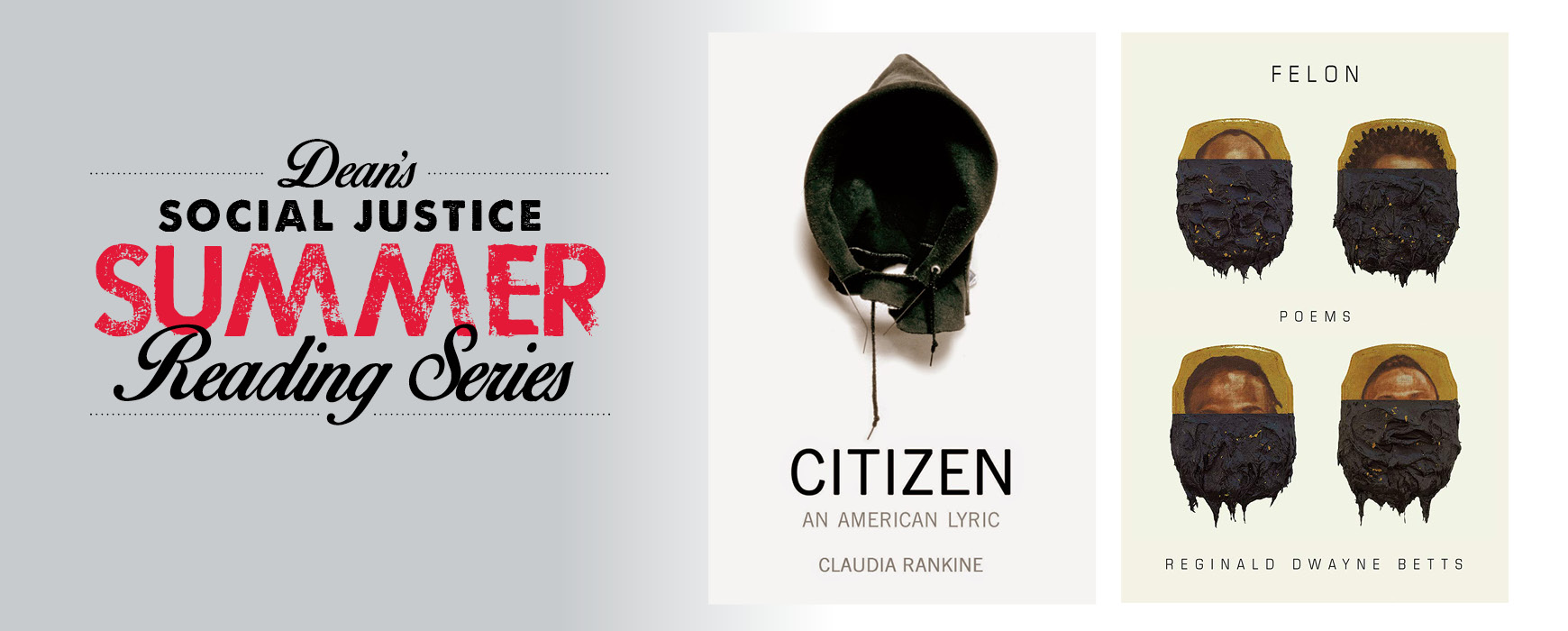2020 Dean's Summer Reading Series

Five years ago, we began a tradition of inviting the GCSW community to join our incoming MSW class in their summer reading assignment. Traditionally the first assignment for our MSW students initiates a journey of critical thinking and action related to social justice.
This year we have chosen to explore two works in tandem as a means to highlight intersections and inequities. Felon by Reginald Dwayne Betts and Citizen by Claudia Rankine are not only timely but necessary. The racial aggressions addressed in Citizen and the harmful effects of incarceration in Felon are topics at the heart of our College’s vision to achieve social, racial, economic, and political justice. Moreover, as we have so painfully witnessed this year, the effects of racism impact all aspects of our society. It is important to us that our students, the next generation of social work leaders, are grounded in understanding the critical role racial justice plays in our profession.
The use of poetry by both authors offers opportunities to create an indelible impression on the impact of racism in our society and the chasms of inequity it creates. Through these works, our goal is to heighten awareness on the effects of injustice and its reverberations through the lives of both individuals and communities.
Previous selections from the Dean's Summer Social Justice Reading Series can be found on our bookshelf.
--
ABOUT Citizen:
Claudia Rankine’s bold new book recounts mounting racial aggressions in ongoing encounters in twenty-first-century daily life and in the media. Some of these encounters are slights, seemingly slips of the tongue, and some are intentional offensives in the classroom, at the supermarket, at home, on the tennis court with Serena Williams and the soccer field with Zinedine Zidane, online, on TV—everywhere, all the time. The accumulative stresses come to bear on a person’s ability to speak, perform, and stay alive. Our addressability is tied to the state of our belonging, Rankine argues, as are our assumptions and expectations of citizenship. In essay, image, and poetry, Citizen is a powerful testament to the individual and collective effects of racism in our contemporary, often named “post-race” society.
ABOUT Felon:
Felon tells the story of the effects of incarceration in fierce, dazzling poems—canvassing a wide range of emotions and experiences through homelessness, underemployment, love, drug abuse, domestic violence, fatherhood, and grace—and, in doing so, creates a travelogue for an imagined life. Reginald Dwayne Betts confronts the funk of postincarceration existence and examines prison not as a static space, but as a force that enacts pressure throughout a person’s life.
The poems move between traditional and newfound forms with power and agility—from revolutionary found poems created by redacting court documents to the astonishing crown of sonnets that serves as the volume’s radiant conclusion. Drawing inspiration from lawsuits filed on behalf of the incarcerated, the redaction poems focus on the ways we exploit and erase the poor and imprisoned from public consciousness. Traditionally, redaction erases what is top secret; in Felon, Betts redacts what is superfluous, bringing into focus the profound failures of the criminal justice system and the inadequacy of the labels it generates.
Challenging the complexities of language, Betts animates what it means to be a "felon."